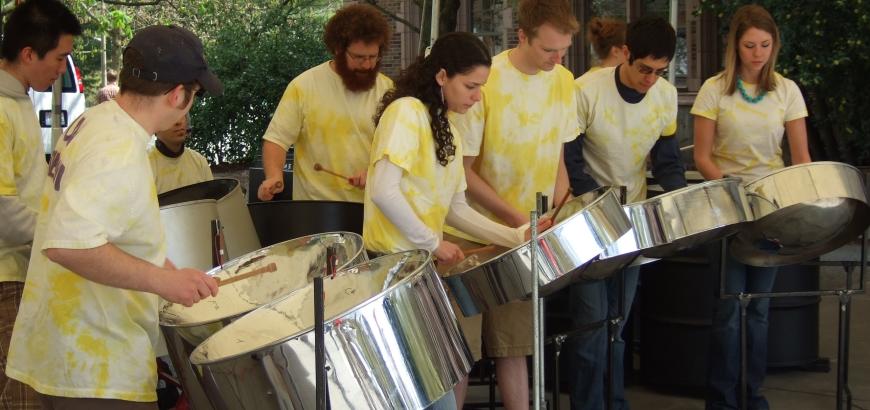The UW Steelband (Shannon Dudley, director) presents an end-of-quarter concert of Caribbean classics—calypso, soca and son montuno--as well as an original new tune by Emily Silks.
Program
Sugar Bum Bum: Aldwyn Roberts, aka Lord Kitchener (arr. Shannon Dudley)
Manicero: Moises Simón (arr. Shannon Dudley)
Show Yuh Emotion: Andre Tanker (arr. Shannon Dudley)
Seven-thirty AM: Emily Silks
Charlotte Street: Ray Holman (arr. Shannon Dudley)
Performers
Kimani Bishop, Joseph Schafer, Emily Silks, Peter Hale, Jacob Schultz, Ryan Singh, Galin Hebert, Nicole Setiawan, Travis Villegas, Anita Kumar ,Melisa Wang
Special Guest
Marisol Berríos-Miranda, guiro
Biographies
UW Steelband
The UW steelband was founded by Ray Holman, who served as Visiting Artist at the UW School of Music from 1998 to 2000. It is directed by Ethnomusicology professor Shannon Dudley, who has played with numerous steelbands in Trinidad and performs in Seattle with Dingolay. The UW steelband’s repertoire tends towards Caribbean dance styles, including calypso, soca and salsa, and students focus on achieving the rhythmic ensemble that this kind of dance music requires.

Shannon Dudley, professor of Ethnomusicology, holds a PhD from the University of California at Berkeley. He teaches courses that include music of Latin America and the Caribbean, American popular music, Music and Community, Comparative Musicianship and Analysis, and graduate seminars in Ethnomusicology. He also directs the UW steeelband.
Dudley has conducted research in Trinidad and Tobago, focusing on the history and music of steelbands. More recent research interests include the musical geography of Santurce, Puerto Rico, as well as Latino contributions to American popular music. His theoretical interests include nationalism, transculturation, and participatory music practices.
His publications include Carnival Music in Trinidad (Oxford University Press, 2004), as well as Music From Behind the Bridge (Oxford University Press, 2008), a history of Trinidad steelband music, and numerous other articles on Caribbean music, including and "Judging by the Beat: Calypso vs. Soca," Ethnomusicology (1996), and “El Gran Combo, Cortijo, and the Musical Geography of Cangrejos/Santurce, Puerto Rico,” Journal of Caribbean Studies (2008).
Dudley is one of the curators (along with Marisol Berríos-Miranda, and Michelle Habell-Pallan) for American Sabor: Latinos in U.S. Popular Music, a bilingual museum exhibit that opened at the Experience Music Project in Seattle in 2008. Between 2008 and 2015 American Sabor was exhibited in 18 cities in the U.S. and Puerto Rico, first in its original version and later in a smaller version prepared in collaboration with the Smithsonian Institution Traveling Exhibit Service. Published as a book with University of Washington Press in 2018 (americansabor.music.washington.edu), American Sabor won the ARSC's 2019 prize for Best Historical Research in Recorded Rock and Popular Music.
In Seattle Dudley performs on steel pan with Dingolay, and participates in the Seattle Fandango Project (SFP), a community music group that practices son jarocho. He helps to run the Ethnomusicology division's Visiting Artist program, which includes Community Artists in Residence from Mexico, Puerto Rico, and elsewhere who participate in collaborations between local arts organizations and university programs.

Marisol has a PhD in ethnomusicology, but her first education came from a childhood in her native Puerto Rico, where she was soaked in music. "I studied music academically, but the way I learned music - who sings well, what had a good rhythm - was sitting down and listening with my dad." She also credits her mother, Juanita Miranda-Berrios. "She is the encyclopedia. She knows everything about Latin rhythm and dance."
Marisol teaches in layers, one rhythm at a time. She recently completed a residency at Alki Elementary School, teaching Latin rhythms to 120 fourth and fifth graders, which culminated in a concert. "They were the best!" she says, "curious, engaged, respectful. 30 years ago, when I came to the United States and was teaching people the Clave, it was almost impossible for them to get it: the side-to-side movements that accompany the rhythm can be difficult. But these kids nowadays hear more Latin and African rhythms at a younger age, they are more exposed to world rhythms." (Clave is the Spanish word for keystone or key. A Clave rhythm is a repeated five-note pattern.)
"The interlocking rhythms and call-response singing of Latin Caribbean music have a special power to generate participation," says Marisol, who used the fellowship to share her knowledge and experience with Eckstein Middle School, taking young jazz musicians to a deeper level of Afro-Caribbean playing. She is also deeply involved with the Seattle Fandango project. "People need to get back to playing music themselves," she says, "all the generations: mamas with babies, teenagers, elders. We are community building through music making. And that's amazing."
As co-curator of the Smithsonian Traveling Exhibit American Sabor, Marisol developed, in collaboration with Shannon Dudley and Michelle Habell-Pallán, a classroom curriculum, educator resources, and guided listening programs. The exhibit highlights the contributions of Latinos to popular music in the United States since World War II.
"One of my purposes is to share the joy and happiness of music and dancing," says Marisol. "This is my way to free the creative impulses in our children, so they have such intense joy in the learning and doing." Quoting Nietzsche, she says, "We should consider every day lost on which we have not danced at least once."
